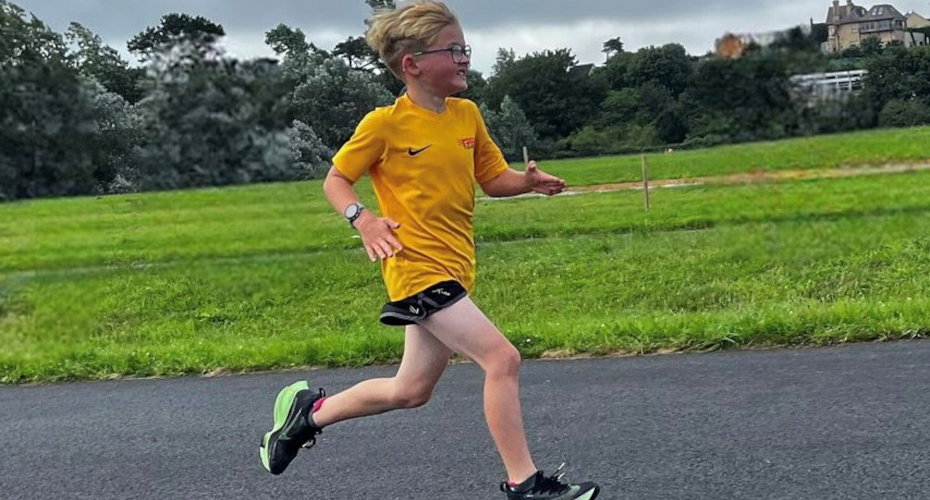Seven-year-old pushing for 5k world record time with help from Exeter sports scientists

A seven-year-old boy from Paignton is attempting to run a world record 5k time for his age group, with support from University of Exeter sports scientists.
Roux Tucker has already set an official fastest time of 21:04 in his local parkrun but is still hoping to better that before he turns eight on August 11.
This is despite only taking up the sport last September when he first went along to the junior parkrun. As Roux got quicker, he was soon running alongside the adults, and he also started researching the fastest 5k times set by seven-year-olds across the world.
“I found someone who had done it in 21 minutes and 21 seconds, so that’s what I was trying to beat,” said Roux. “I was getting closer to it each run and on July 1st I had a world record attempt and I’ve been getting even faster since then. I’m just going to keep going.”
Roux’s dad, Robbie Tucker, said: “I can’t keep up with him. You’re supposed to run with your children if they’re under 11, but I physically can’t so we have to get other people to run with him now. A lot of the times out there aren’t official world records and we’re going to need to get some evidence together, but we’re going to wait until just before he turns eight to try and go for it.”
Roux is being supported in his effort by the University of Exeter, where sports scientists Luke Liddle and Max Weston have been doing Athlete Testing to measure things like his heart rate, blood lactate, and oxygen uptake. They perform an incremental exercise test to exhaustion to observe physiological outcomes such as the lactate threshold and maximal oxygen uptake (V̇O2max). Roux performs these tests in the same laboratory and on the same equipment used by some of the world’s best runners.
Dr Luke Liddle is an Associate Lecturer in Human Physiology at the University of Exeter and said: “There was a big social media push for Roux when he was attempting to beat the 5k world record for a seven-year-old and I asked if there was any way we could help and support him. Since starting to work with Roux I’ve been looking at the V̇O2max levels for his age group and they’re extremely hard to find, but he is on par or just below older children who are classed as elite athletes.”
A recent study that included 29 endurance trained pre/early-puberty boys showed an average V̇O2max of 55.8 ± 7.2 ml·kg·min-1. Luke says that Roux’s latest V̇O2max of 59.7 ml·kg·min-1 shows he has; “an exceptional aerobic (endurance) capacity for a seven-year-old, given that many of the boys in the recent study will be older than Roux.”
Max Weston is an Associate Lecturer from Sport and Health Sciences at the University of Exeter and said: “There’s very limited data on seven-year-old elite athletes so it’s difficult for us to say this is what he should be doing and this is where he should go. But that’s what excited us, looking at all these variables now and how they could evolve in the future. The main aim is to support what he’s doing and put some physiology to that. The cool thing for Roux is he’s come in and done exactly the same tests with us as some elite marathon runners – names you’d recognise off the TV. For him to have the bravery to do that at his age is incredible.”
Robbie added: “Roux isn’t only a good runner but a really gifted mathematician and has been put in a higher maths class at school, so he’s really interested in finding out the numbers and stats behind his running. We really appreciate everything the university has done for Roux and he has learned a lot from the process.”



